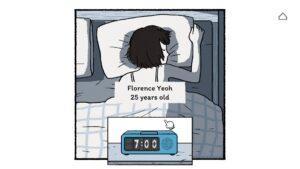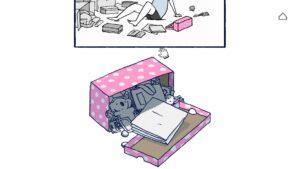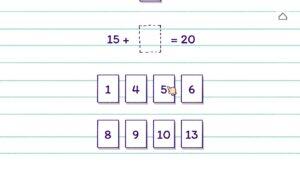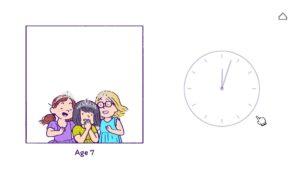
NOTE: This Critical Play contains spoilers.
For my Critical Play, I chose the game Florence. Florence, by Mountains, is an interactive novel type game meant for emotionally mature adults. Florence is a game about the title character’s life and romantic relationship. Florence is about depression. It tackles this subject in a way that represents her identities as Asian and as a woman. It’s about filling that void with a person, and the beauty in that. It draws attention to the more stressful and beautiful parts of a relationship. But it’s also about growing as a person, and healing that void through growth rather than romance.
The game begins with Florence surrounded in gray. You click through a life of train rides, filled with Instagram posts and listening to music, and gritting your teeth through calls from your mother. As a feminist, I’m very proud of the depiction of the relationship between Florence and her mother. The somewhat-nagging, controlling, yet under-the-surface loving relationship between Florence and her mother is something that I wasn’t aware of, until I started talking to my sister and woman friends about it. I’m glad to see more depictions of it in media.

You return to eating food alone in your room, and in general stuck in a rut of a boring life, when you stumble upon a box.

In this box is Florence’s childhood. In it, we play through a girlhood filled with color and goofy friends.
Activities like cutting out shapes to paste in outlines are actually very fun. I spent like 10 minutes making this awesome boat, and I felt like a kid again. This creativity was different from the mundane, yet still interesting parts of the game preceding it.

Everything changes when Florence’s mother comes in to force her to do math problems.

What starts as a couple of problems, slowly sucks the beauty out of the world around her. Through photos it’s indirectly hinted that Florence’s father is not in her life, and so although the actions of Florence’s mother make more sense considering she wants her daughter to succeed, as a player you initially feel Florence’s mother as a vacuum that sucks what remaining happiness Florence has whenever she is present. As a player, you are forced to pull the clock forward out of this color full past and back into the present.

The color design is great at communicating how from this state of depression, people can become saviors.

I initially didn’t like Kris. As a (somewhat jaded) feminist who has been in relationships while depressed, I don’t want to believe that feminine growth and self-discovery should be reliant on finding a partner. I wanted something more than the typical love story. But I was surprised at how accurate the game 
was to the feelings of being in the beginnings of a relationship. You get to experience the joy of a being a guy frantically cleaning your messy room a moment before your date arrives. Everything, even the small things seem imbued with life and color. Every aspect of Florence’s (somewhat terrible) life is pasted over with this happy music and color as all the old activities you go through (clicking through spreadsheets) are filled with joy.

Then the arguments start.

The great part about the arguments in this game is that you never feel good about the sentences you are constructing to come out of your mouth, but you know that if you say nothing, you will be crushed under the weight of the other person. What starts out as you defending yourself turns into crushing the other person. I think this pretty accurate. As a feminist, I’m glad this game depicts arguments realistically and not as some pointless exercise in convincing one crazy partner to see the other’s true love.
The arguments don’t end the relationship, the couple resolves them and continues to live happily for a while.

Then, as time passes, the rosy tint of the relationship grows old, and the color is drained from both of them as the real fights begin.

Florence returns to the depression of her life, but now with no one to save her, she is able to move on and gain the encourage to pursue a life worth living. Now she is creating the color in her life, not chasing for it in others. Her relationship with her mother improves. As a feminist, this seems like the ideal outcome.



